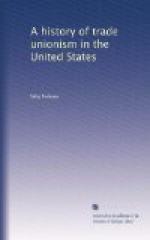The Knights were in nearly every case the aggressors, and it is significant that among the local organizations of the Knights inimical to trade unions, District Assembly 49, of New York, should prove the most relentless. It was this assembly which conducted the longshoremen’s and coal miners’ strike in New York in 1887 and which, as we saw,[25] did not hesitate to tie up the industries of the entire city for the sake of securing the demands of several hundred unskilled workingmen. Though District Assembly 49, New York, came into conflict with not a few of the trade unions in that city, its battle royal was fought with the cigar makers’ unions. There were at the time two factions among the cigar makers, one upholding the International Cigar Makers’ Union with Adolph Strasser and Samuel Gompers as leaders, the other calling itself the Progressive Union, which was more socialistic in nature and composed of more recent immigrants and less skilled workers. District Assembly 49 of the Knights of Labor took a hand in the struggle to support the Progressive Union and by skillful management brought the situation to the point where the latter had to allow itself to be absorbed into the Knights of Labor.
The events in the cigar making trade in New York brought to a climax the sporadic struggles that had been going on between the Order and the trade unions. The trade unions demanded that the Knights of Labor respect their “jurisdiction” and proposed a “treaty of peace” with such drastic terms that had they been accepted the trade unions would have been left in the sole possession of the field. The Order was at first more conciliatory. It would not of course cease to take part in industrial disputes and industrial matters, but it proposed a modus vivendi on a basis of an interchange of “working cards” and common action against employers. At the same time it addressed separately to each national trade union a gentle admonition to think of the unskilled workers as well as of themselves. The address said: “In the use of the wonderful inventions, your organization plays a most important part. Naturally it embraces within its ranks a very large proportion of laborers of a high grade of skill and intelligence. With this skill of hand, guided by intelligent thought, comes the right to demand that excess of compensation paid to skilled above the unskilled labor. But the unskilled labor must receive attention, or in the hour of difficulty the employer will not hesitate to use it to depress the compensation you now receive. That skilled or unskilled labor may no longer be found unorganized, we ask of you to annex your grand and powerful corps to the main army that we may fight the battle under one flag.”




